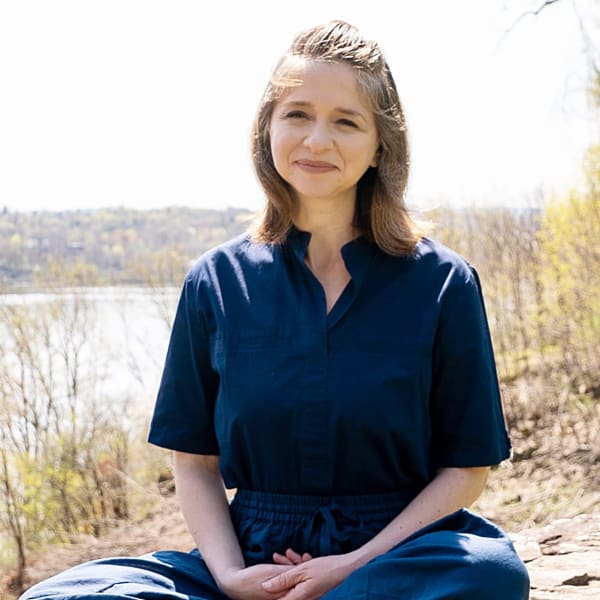Religion Can Learn From Mindfulness

I’ve always loved Judaism, but I also experienced shame with it and felt this important part of my identity was at odds with my everyday American life. While this has changed in my adult years, I’ve come to realize how much the religion could benefit from mindfulness practices — giving it a radical new approach that will resonate with future generations.
In his book, “My Grandmother’s Hands,” Resmaa Menakem, a trauma specialist, talks about racial and intergenerational trauma. He says, “When trauma continues across generations for a long time, it can look like culture.” That's what comes to mind when I think of anxiety in the Jewish community.
We all joke about it, how it looks like our culture, but dealing with it in this manner has all sorts of negative ramifications. What would happen if we started looking at this — and every other part of Jewish life through the lens of mindfulness?
The Mindfulness of Judaism
But what do mindfulness and Judaism have in common? Most people may think the answer is “nothing.” I find this interesting because I believe mindfulness is actually at the heart of Judaism. For example, in our most important prayer, we’re expected to teach our children that God, the divine, or an unspeakable force of truth is “one.”
A very rudimentary reading of that prayer is, “Only have one God,” but a more nuanced approach teaches us that everything is interconnected and imbued with this divine presence which, in my opinion, is a core principle of mindfulness. And what could be more mindful than the concept of Sabbath? For one full day each and every week, Jewish people are asked to stop creating or spending money, and are encouraged to sit and just be with the world instead.
But perhaps the biggest indicator of mindfulness in Judaism is the practice of observing the Shmita year. Commemorated in 2021, the word Shmita means to release, and this period is observed every seventh year in the Jewish calendar.
Historically, Jewish communities would let the land lie fallow during the Shmita year, only harvesting essential crops to give it time to regenerate. In addition, members of the Jewish community released all debts during this time. A Shmita year, like many practices in mindfulness, is profoundly anti-capitalist — moving away from driving the profit out of the land and ourselves at all costs. It's a radical approach that asks us to take responsibility for everything we do, and to create a different kind of way — a spiritual way — of relating to time.
While that isn’t how Judaism is presented in the mainstream context, mindfulness is at the heart of my religion and meditation practice. And I like to fuse them even further, for example, by borrowing concepts from Buddhism — especially regarding mapping how the mind works — and overlaying them to Judaism.
Battling Antisemitism With Mindfulness
Growing up, I remember feeling shame and embarrassment about Judaism in spaces where most people weren’t Jewish. By stepping into my identity as a white girl, I was able to avoid being lumped together with all the Jewish people or the ideals of Judaism that I didn’t agree with. Through meditation, I am learning how to better cope with historical and present antisemitism, and heal from my own internalized antisemitism.
This is part of the reason I believe it’s so important to teach the Jewish community about meditation and mindfulness. Highlighting the similarities between these practices and our religion and culture serves as a tool to enliven our tradition for many people. Research suggests that Judaism is vanishing because young people are becoming more assimilated to American culture. Teaching Jewish mindfulness helps breathe relevance into Judaism in a way that speaks to all people — especially young people who are living in an age where mindfulness and meditation are gaining increasing popularity.
The Future of Jewish Meditation
Today, I’m part of a growing community of like-minded Jewish meditation teachers in the U.S. Many of us have experience in Buddhism, while many others are rabbis. Together we weave insights from Buddhism and Judaism to teach the new generations how they can relate to Judaism through mindfulness and meditation.
While none of my meditation classes on Roundglass are directly based in Jewish mindfulness, they are influenced by it, because that's who I am. If you’re Jewish, or just into Jewish mindfulness, there are many organizations where you can learn about Judaism as it relates to meditation.
The first three that come to mind are the Institute for Jewish Spirituality, Or HaLev — which means light of the heart in Hebrew — and The Awakened Heart Project. All three are based in the United States, and have retreats and online classes, among many other methods to investigate the connection between Judaism and mindfulness.
Try this Roundglass course, See Loneliness as a Gift, by meditation teacher Yael Shy, to learn how to familiarize yourself with the parts of you that don't feel seen, in addition to coping with feelings of isolation.
Header Photo by: The Good Brigade/DigitalVision/Getty Images
Key Takeaways:
- Interconnectedness is a core principle of mindfulness, and spirituality.
- Mindfulness can use used as a tool to enliven tradition and culture.




